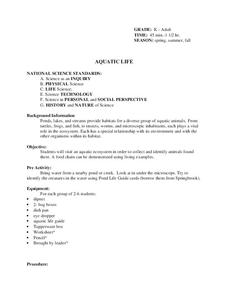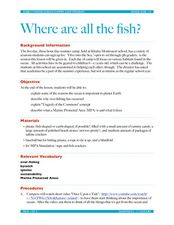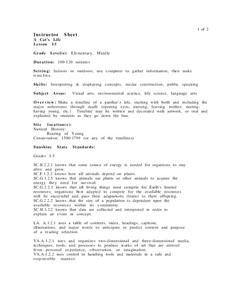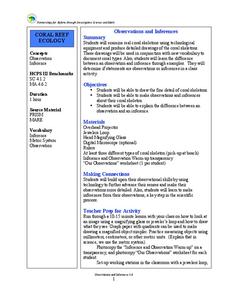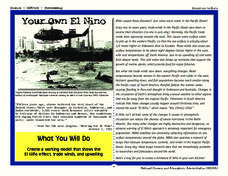Curated OER
Animals A to Z: Sea Turtle
For this sea turtle worksheet, 3rd graders will add pages to their "animal books." Students will read 10 facts to gain an understanding of a sea turtle and its particular attributes.
Curated OER
Animals A to Z: Shark
In this shark worksheet, 3rd graders will add pages to their "animal books." Students will read 10 facts about a shark to gain an understanding of the animal's characteristics.
Curated OER
Science Types of Animals and Their Traits
Expose your students to the wonders of scientific vocabulary with this resource. Each slide contains a word and definition related to animal types and traits, concept vocabulary covered includes, traits, animal types, threatened,...
Curated OER
Megabeasts
Create larger-than-life insects for the classroom. Bugs are usually pretty small, but during the Jurassic period they were huge. Kids use diagramming and scale conversion to enlarge a modern day insect so that it is as big as its ancient...
Curated OER
Pond Life
Students explore pond ecosystems. In this living environment activity, students observe the local pond and identify the living things they find by drawing pictures. Students observe organisms that were found in the pond by using a...
Curated OER
Birth, Growth and Development
Young scholars discover that all living things have a life cycle in which they are born, reproduce and die. In groups, they examine and analyze the changes that happen during the lifespan of a human. To end the instructional activity,...
Curated OER
Seed Dispersal
Students determine seed dispersal methods. In this life science lesson, students make predictions about how seeds might move, then look at seeds under micrographs or microscopes to analyze the seed coat and how this helps dispersal. ...
Curated OER
Introduction to Seed Germination
Students explore seed germination. In this life science instructional activity, students start seeds in Petri dishes, then observe which ones germinate and make predictions.
Curated OER
Lost Ladybugs
Students study ladybugs. In this life science lesson plan, students collect ladybugs from the schoolyard and explore their characteristics. Students illustrate pictures of ladybugs.
Curated OER
Aquatic Life
Students explore aquatic life. For this science lesson, students visit an aquatic ecosystem and collect animals found there. Students create a food chain for the aquatic ecosystem.
Curated OER
Sea Connections
Learners, after locating different marine habitats on a globe, play a card game about ecosystems, food webs and organisms.
Curated OER
Where Are All the Fish?
Students identify the problems that marine life is facing today. In this marine science instructional activity, students explain how Marine Protected Areas can help the ocean and the fish. They brainstorm ways to help in the conservation...
Curated OER
A Cat's Life
Students construct a timeline of a panther's life. Students decorate their timeline with illustrations and words, or they can choose to have it orally read to the class. Students use the computer to construct their time-lines. Students...
Curated OER
Predator/Prey Activity: Fish Feeding, Environments, and General Behavior
Students explore concepts of environment and survival among different marine life, focusing on the ocean environment.
Curated OER
Gifts From the Sea
In this marine animal worksheet, 3rd graders study the parts of seaweed. Students label 2 seaweed diagrams and study 24 household objects, circling those that come from seaweed extracts and/or ingredients.
Curated OER
Observations and Inferences
Learners examine coral skeletons. For this science lesson, view real coral skeletons. Students explain the differences between an observation and an inference. Learners draw a coral skeleton.
Curated OER
Where do Butterflies Come From?
After tapping into their memories or experiences of baby animals, viewers delve into the insect life cycle of a butterfly and the amphibian life cycle of a frog. When exploring life cycles, show this presentation to your elementary life...
Curated OER
Medical Explorer
After reading a case study, pupils will explore possible diagnoses, assessment, and treatment plans. Finding the definitions to medical vocabulary and sorting through patient history, they will begin to understand the process of...
Curated OER
Are Dams Forever?
Learners consider the life span of dams, and what would happen if a dam falls apart. In this environmental impact lesson, students discuss what the purposes of dams are, how they could be damaged.
Agriculture in the Classroom
Seed Match
Using this resource, your team of green thumbs discuss why plants are a part of a healthy diet and the different ways they are used in daily life. They then observe the characteristics of different seed as they attempt to match...
Curated OER
Earth's Heavenly Treasures: Hummingbirds
Young ornithologists watch an informative video and use the Internet to gather data about the life, size, habitat, and migration of hummingbirds. The interdisciplinary lesson includes activities that target art, science, math, and...
Curated OER
Plankton in the Air
Here is a lab activity adequate for use with any full lesson plan on environmental factors that shape animal adaptations or marine animal characteristics. Pupils will discuss the role plankton plays in the environment and filter-feeding...
Curated OER
Butterflies
For this science and reading comprehension worksheet, students read a 1 page detailed passage about butterflies. Students then answer 7 questions.
NOAA
Your Own El Nino
Scholars make a model to discover how the force of trade winds over the Pacific Ocean creates an El Niño. Super scientists observe how the severe weather affects life in water and on land.
Other popular searches
- 4th Grade Life Science
- Life Science Inquiry
- Life Science Vertebrates
- Life Science Experiments
- K 2 Life Science
- Life Science on Cells
- Life Science Lesson Plans
- Grade 4 Life Science
- Life Science Report Topic
- Australia Life Science
- The Life Science
- Life Science Lessons









